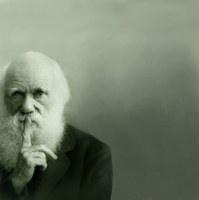Personality and Polemic
Kevin Moss | 18:54, 19th July 2014
 As one studies the history of movements and ideas, as I have had to do with my Biola MA, it becomes swiftly apparent that the personalities involved play as important a part as the ideas themselves. It is a prominent misconception within modern scientism(1) that, somehow the 'facts' float free in a kind of disembodied, wholly objective state – in such a way that they are immediately accessible to empirical human analysis.
As one studies the history of movements and ideas, as I have had to do with my Biola MA, it becomes swiftly apparent that the personalities involved play as important a part as the ideas themselves. It is a prominent misconception within modern scientism(1) that, somehow the 'facts' float free in a kind of disembodied, wholly objective state – in such a way that they are immediately accessible to empirical human analysis.
In fact, everything we think we know is mediated by the human personalities that may have been lucky enough to have first-hand access to the data – or more often than not, are drinking at the well through second, third or fourth-hand conduits. Each tier of human interpolation brings its own version of Chinese whispers to the pursuit of knowledge and understanding. That doesn't have to be a bad thing, but we will have a wholly unrealistic view of epistemology if we don't recognise it.
My wife has just finished reading Annie's Box by Randal Keynes. It swiftly becomes apparent that the searing trauma suffered by the Darwins when they lost their precious young daughter, has as much to do with the publishing of 'On The Origin of Species' as anything else. Indeed, if the narrative worked through in the film 'Creation' is accurate, it seems likely that 'Origin' would not have been published, if it were not for that pivotal event in the family's life. You can extend the principle further, if you will, and see standing behind Darwin a queue of thinkers, all committed to a naturalistic worldview, a few of which dabbled in science. Naturalism (or physicalism) was a philosophical perspective which existed in the minds of certain thinkers over the centuries – all Darwin did was give those beliefs a nice new set of clothes.
I was thinking of this viewpoint recently, as I prepared for one of the Highfields Church Summer Seminars on the reliability of the Bible. It is fascinating to look at the succession of personalities who have followed one another in order to deliver to us the polemic that the Bible is somehow not to be trusted, too unreliable for intelligent men and women to base their lives upon it. We see atheist philosophers such as David Hume setting the stage, upon which a succession of sceptics will strut their stuff, each citing the thesis of the previous generation. There is little evidence of a critical analysis of previous layers of scepticism in the rush to lay the next tier in the edifice of a fully-fledged naturalism. The questioning of dodgy ideas is clearly not conducive to the bigger plan of painting God out of the picture, in order to turn him into the 'god of the gaps' rather than the ground and foundation of human knowledge.
Arguably, the man currently cementing in place the latest tier in this structure is Bart Ehrman, a prolific author and popular speaker. As I studied his story, one of the loss of faith, I was shocked to discover that the nails in the coffin of his belief were a series of biblical passages (Mark 16:9-20, John 8:1-11, Luke 22:43-44 and Matt. 5:22) that apparently completely undermined his confidence in the Bible. Now, I may walk in different circles, but the hermeneutical and textual issues related to these passages are so well-known that it is unimaginable that they would result in the shipwreck of faith for any thinking Christian. We place our faith in the Person of Christ, and his resurrection – not in a theory of inerrancy that is so brittle that it would not survive the slightest challenge.
Those textual issues might be the reason given in books that establish an academic credibility. Elsewhere, however, Ehrman gives another explanation which I surmise is probably more realistic:
About nine or ten years ago I came to realize that I simply no longer believed the Christian message. A large part of my movement away from the faith was driven by my concern for suffering. I simply no longer could hold to the view - which I took to be essential to Christian faith - that God was active in the world, that he answered prayer, that he intervened on behalf of his faithful, that he brought salvation in the past and that in the future, eventually in the coming eschaton, he would set to rights all that was wrong, that he would vindicate his name and his people and bring in a good kingdom (either at our deaths or here on earth in a future utopian existence)
Now, the problem of suffering is quite a different matter - and it's one which occupies the thinking of all kinds of philosophers. Naturalists do not produce explanations which are intellectually, emotionally or spiritually any more satisfying than those that Christians may come up with (in fact, one could argue, quite the reverse). But this does suggest that the departure into the futility of scepticism may have little to do with 'the facts'.
(1) Scientism is the view that science is the only paradigm for truth and rationality: thus, everything outside of science is a matter of mere belief and subjective opinion. According to this view, the arts, humanities, philosophy and (especially) religion are relegated to inferior status, in favour of an ideal of 'empirical', rational scientific investigation. This view sustains itself by a number of unverifiable presuppositions.
Document Actions

